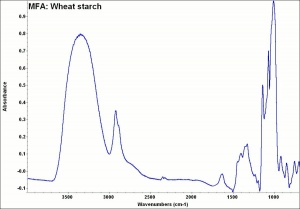Difference between revisions of "Wheat starch"
(username removed) |
|||
| (10 intermediate revisions by 4 users not shown) | |||
| Line 1: | Line 1: | ||
| − | [[File: | + | [[File:615-1000.jpg|thumb|Wheat starch]] |
== Description == | == Description == | ||
| − | Polysaccharide granules that compose about 70% of [ | + | [[Polysaccharide]] granules that compose about 70% of [[wheat flour]]. Wheat starch is separated from the [[gluten]] and fibrous particles by sieving then wash flotation. It is composed of 18-27% [[amylose]]. When heated with [[water]], wheat starch forms a low viscosity solution that does not change with heating time. It thickens substantially on cooling and to form an opaque gel. Wheat starch dries to form a strong bond. It is susceptible to biological attack and may turn gray or yellow with age. Wheat starch paste is the primary adhesive used by paper conservators for hinging, mending, lining ,and reinforcement (AIC Book and Paper Catalog). |
| − | [[File: | + | [[File:strchpstgh.jpg|thumb|Wheat starch]] |
== Synonyms and Related Terms == | == Synonyms and Related Terms == | ||
| − | almidón de trigo (Esp.); amidon de blé (Fr.); amido di grano (It) | + | wheat starch paste; almidón de trigo (Esp.); amidon de blé (Fr.); amido di grano (It) |
Examples include: Aytex P [Henkel]; Starbake starch [Hercules]; Paygel [General Mills]; Sin-nori; Jin-Shofu | Examples include: Aytex P [Henkel]; Starbake starch [Hercules]; Paygel [General Mills]; Sin-nori; Jin-Shofu | ||
| − | |||
[[[SliderGallery rightalign|MFA- Wheat starch.jpg~FTIR]]] | [[[SliderGallery rightalign|MFA- Wheat starch.jpg~FTIR]]] | ||
| + | == Applications == | ||
| + | * Hinging | ||
| + | * Gluing | ||
| + | * Adhering paper-based products | ||
| − | == | + | == Risks == |
| + | Susceptible to biodeterioration. Dried films become brittle with age. | ||
| + | |||
| + | Talas: [http://talasonline.com/photos/msds/wheat.pdf MSDS] | ||
| + | == Physical and Chemical Properties == | ||
Fine oval shaped granules. Granule size = 3 - 35 micrometers | Fine oval shaped granules. Granule size = 3 - 35 micrometers | ||
| Line 21: | Line 28: | ||
Turns blue-violet with iodine. | Turns blue-violet with iodine. | ||
| − | + | Microscopic identification: in a dispersed sample, wheat starch particles are colorless and rounded to oval-shaped with a broad particle size distribution from fine to coarse. Under crossed polarized light, birefringence is low with first-order grays and whites observed, and an extinction cross is visible which is sometimes distorted from the center. The shape of this extinction cross can be used to distinguish wheat from other starches (potato, maize). | |
| − | |||
| − | |||
| − | |||
| − | |||
== Additional Images == | == Additional Images == | ||
| Line 32: | Line 35: | ||
File:1_Wheat_starch_200XS.jpg|Wheat starch | File:1_Wheat_starch_200XS.jpg|Wheat starch | ||
File:1_Wheat_starch_200XS_pol.jpg|Wheat starch | File:1_Wheat_starch_200XS_pol.jpg|Wheat starch | ||
| + | File:PLM Wheat Starch Grains Reference PPL 400x.jpg|Wheat starch, PPL, 400x | ||
| + | File:PLM Wheat Starch Grains Reference XPL 400x.jpg|Wheat starch, XPL, 400x | ||
| + | File:PLM starch particle with lake PPL 400x.jpg|Wheat starch used as base for organic red lake, PPL, 400x | ||
| + | File:PLM2 starch particle with lake XPL 400x.jpg|Wheat starch used as base for organic red lake, XPL, 400x | ||
</gallery> | </gallery> | ||
| − | + | == Sources Checked for Data in Record == | |
| − | == | + | * Rachael Perkins Arenstein, Lisa Goldberg, and Eugenie Milroy, ‘Support and Rehousing for Collection Storage’ In ‘Preventive Conservation: Collection Storage’ Lisa Elkin and Christopher A. Norris (eds.), Society for the Preservation of Natural History Collections, New York. 2019. |
* Book and Paper Group, ''Paper Conservation Catalog'', AIC, 1984, 1989 | * Book and Paper Group, ''Paper Conservation Catalog'', AIC, 1984, 1989 | ||
Revision as of 11:12, 27 November 2019
Description
Polysaccharide granules that compose about 70% of Wheat flour. Wheat starch is separated from the Gluten and fibrous particles by sieving then wash flotation. It is composed of 18-27% Amylose. When heated with Water, wheat starch forms a low viscosity solution that does not change with heating time. It thickens substantially on cooling and to form an opaque gel. Wheat starch dries to form a strong bond. It is susceptible to biological attack and may turn gray or yellow with age. Wheat starch paste is the primary adhesive used by paper conservators for hinging, mending, lining ,and reinforcement (AIC Book and Paper Catalog).
Synonyms and Related Terms
wheat starch paste; almidón de trigo (Esp.); amidon de blé (Fr.); amido di grano (It)
Examples include: Aytex P [Henkel]; Starbake starch [Hercules]; Paygel [General Mills]; Sin-nori; Jin-Shofu
Applications
- Hinging
- Gluing
- Adhering paper-based products
Risks
Susceptible to biodeterioration. Dried films become brittle with age.
Talas: MSDS
Physical and Chemical Properties
Fine oval shaped granules. Granule size = 3 - 35 micrometers
Gelatinization temperature = 58 - 64 C
Turns blue-violet with iodine.
Microscopic identification: in a dispersed sample, wheat starch particles are colorless and rounded to oval-shaped with a broad particle size distribution from fine to coarse. Under crossed polarized light, birefringence is low with first-order grays and whites observed, and an extinction cross is visible which is sometimes distorted from the center. The shape of this extinction cross can be used to distinguish wheat from other starches (potato, maize).
Additional Images
Sources Checked for Data in Record
- Rachael Perkins Arenstein, Lisa Goldberg, and Eugenie Milroy, ‘Support and Rehousing for Collection Storage’ In ‘Preventive Conservation: Collection Storage’ Lisa Elkin and Christopher A. Norris (eds.), Society for the Preservation of Natural History Collections, New York. 2019.
- Book and Paper Group, Paper Conservation Catalog, AIC, 1984, 1989
- Jane Down, Adhesive projects at the Canadian Conservation Institute, Preprints of the SSCR's 2nd Resins Conference, Sept. 1995, Scottish Society for Conservation & Restoration, Edinburgh
- G.S.Brady, Materials Handbook, McGraw-Hill Book Co., New York, 1971 Comment: p. 768
- Conservation Support Systems, Catalog, 1997
- Art and Architecture Thesaurus Online, http://www.getty.edu/research/tools/vocabulary/aat/, J. Paul Getty Trust, Los Angeles, 2000








